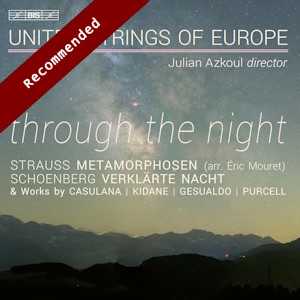
Through the Night
United Strings of Europe/Julian Azkoul
rec. 2021/22, St Silas Church, Kentish Town, London; All Saints Church, Durham Road, London Contents beneath review
BIS BIS2589 SACD [78]
This programme is aural catnip for me, being a medley of some of the most melancholically beautiful pieces of “Music of the Night” for strings: the two main items are among my absolute favourite works for string orchestra – hence my surveys of both (Metamorphosen and Verklärte Nacht) – supplemented by four bon-bons, an admixture of ancient and modern works in interesting arrangements. Furthermore, early this year I had the pleasure of reviewing a Tchaikovsky album of the same generous duration from the same artists on the same label (review), dubbing it “a very attractive, wholly successful and, indeed, unique, collection” – so my expectations for this new album from BIS were high.
The United Strings of Europe is a somewhat smaller band in number than often plays these pieces but their virtuosity, homogeneity and clarity of line compensate for any perceived lack of heft; besides, the whole point of the Mouret arrangement of Metamorphosen, for example, is that he conceived it for 16 rather than 23 players. Of course, Karajan used more strings with Strauss’ blessing, but this arrangement – vaunted as a “world premiere” recording – allows us to hear, as the notes put it, “an immediacy to the counterpoint…with incisive unsentimental clarity” – and as much as I love Big Band versions, I agree. This is lovely playing, entirely in sympathy with the mercurial, ambivalent mood of the piece, at times searingly sparse and desolate, then sumptuously Romantic and indulgent, reflecting the ambiguity of the work.
The arrangement of Verklärte Nacht used here is that most commonly played, Schoenberg’s last, 1943 version for 16 strings, and has a conventional timing of thirty minutes – which nonetheless leans towards a somewhat more leisurely tempo, as per my personal preference and is executed with enormous passion, which, as ever in successful performances, creates the illusion of a far bigger body of instrumentalist being involved without sacrificing the clarity of individual lines.
I feel somewhat fraudulent in recommending yet another release for the rendering of those two major works, having already endorsed so many others in my surveys, but both pieces benefit from a wealth of superb recordings and this latest merely adds to their lustre. This ensemble produces the most beautiful, singing, bell-like tone and phrases with the utmost sensitivity and unanimity.
However, as I indicate in my introduction above, they are not the only attractions of this disc. The discord with which the Casulana opens tells us that it has received a modern treatment, as do the subsequent chromatic slides and meanderings which eventually land on F-sharp major, then the music modulates to G major in the second madrigal section and achieves repose – very absorbing.
The modern work by Daniel Kidane – another “world premiere recording” – has attracted some critical praise but as a succession of string tremolos without much shape or progression, frankly, it leaves me neither shaken nor stirred. Much more engaging is another madrigal transcribed for strings by American composer and violinist Michi Wiancko; it evinces all the tropes familiar to devotees of this most tormented of composers, its “chiaroscuro” effects of sighing and lamenting alternating with agitated passages depicting the crowd urging Christ’s arrest.
A lush arrangement of Dido’s Lament by Stokowski completes my bliss. The sound from BIS is typically exemplary and the whole package is contained within a slim, cardboard digipack containing useful notes.
Ralph Moore
Help us financially by purchasing from



Contents
Richard Strauss (1864-1949)
Metamorphosen (1944-45, arr. Éric Mouret)
Arnold Schoenberg (1874-1951)
Verklärte Nacht (1943 version for string orchestra)
Maddalena Casulana (c. 1544-c.1590)
Morir non può il mio cuore from Il desidierio libro primo (1566; arr. Simon Parkin)
Daniel Kidane (b. 1986)
Be Still for strings and crotales (2020)
Beibei Wang (crotales)
Carlo Gesulado (1566-1613)
Tristis est anima mea (1611; arr. Michi Wiancko)
Henry Purcell (1659-1695)
Dido’s Lament from Dido and Aeneas (1689; arr. Leopold Stokowski)


















